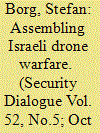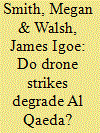| Srl | Item |
| 1 |
ID:
182651


|
|
|
|
|
| Summary/Abstract |
This article examines how unmanned aerial vehicles (UAVs), or drones as they are more popularly known, have changed practices of Israeli warfare. In order to do so, the article proceeds in three steps. First, it traces the emergence and development of the Israeli UAV programme. Second, it examines the main factors that have enabled its expansion. Third, it turns to some of the main implications of UAVs for the way in which the Israeli Defence Force (IDF) wages war. The article argues that the combined tactical use of UAVs employed for intelligence, surveillance and reconnaissance (ISR) tasks has amounted to a strategic effect: by dramatically enhancing the field of perception, UAVs have enabled the IDF to better control the battle rhythm. UAVs in the Israeli context have enhanced the IDF’s operational sustainability, since one’s own casualties have been virtually eliminated and civilian casualties have been stretched out over, rather than concentrated in, time. Throughout the article, the changing character of the UAV is emphasized. To capture this change and to unravel the interactions among technology, warfare and broader societal forces, the article draws on actor-network theory.
|
|
|
|
|
|
|
|
|
|
|
|
|
|
|
|
| 2 |
ID:
190514


|
|
|
|
|
| Summary/Abstract |
This article analyzes the effect of combat use of unmanned aerial vehicles (UAVs) in the course of the Nagorno-Karabakh conflict and draws conclusions about the likely nature of warfare in regional conflicts of the future.
|
|
|
|
|
|
|
|
|
|
|
|
|
|
|
|
| 3 |
ID:
120332


|
|
|
|
|
| Publication |
2013.
|
| Summary/Abstract |
The United States has used unmanned, aerial vehicles-drones-to launch attacks on militants associated with Al Qaeda and other violent groups based in Pakistan. The goal is to degrade the target's capacity to undertake political and violent action. We assess the effectiveness of drone strikes in achieving this goal, measuring degradation as the capacity of Al Qaeda to generate and disseminate propaganda. Propaganda is a key output of many terrorist organizations and a long-standing priority for Al Qaeda. Unlike other potential measures of terrorist group activity and capacity, propaganda output can be observed and measured. If drone strikes have degraded Al Qaeda, their occurrence should be correlated with a reduction in the organization's propaganda output. The analysis presented here finds little evidence that this is the case. Drone strikes have not impaired Al Qaeda's ability to generate propaganda.
|
|
|
|
|
|
|
|
|
|
|
|
|
|
|
|